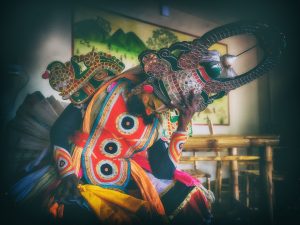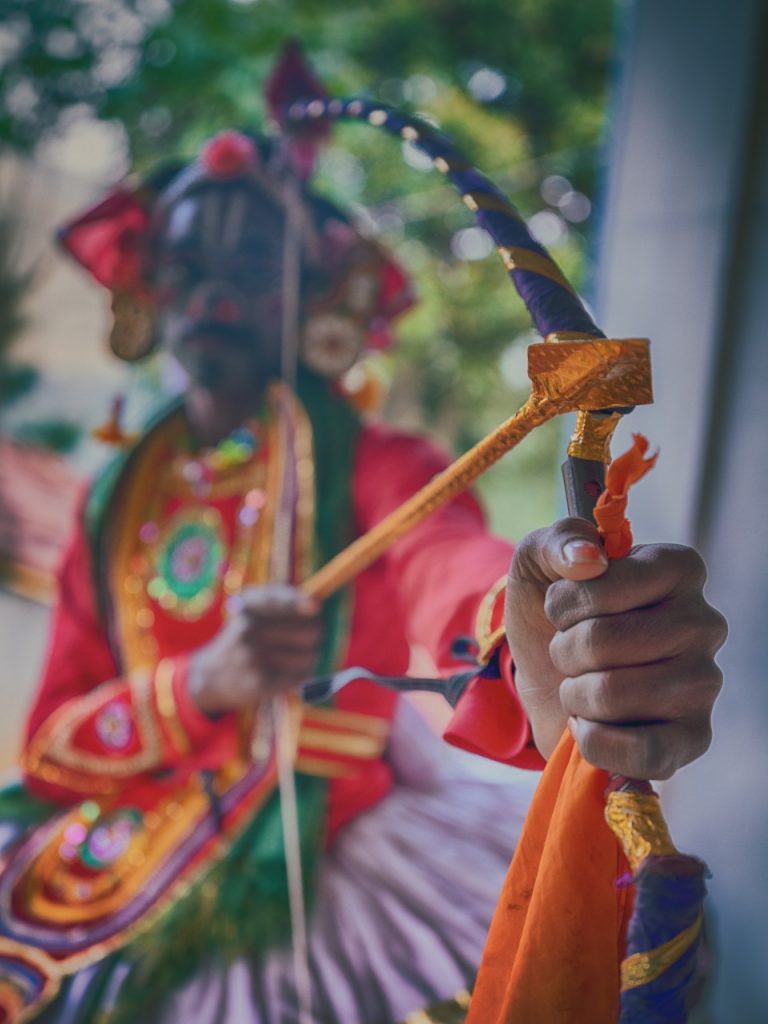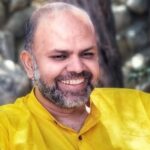
I see a bunch of smiling and delighted faces in the pictures shared by Raghu and other facilitators from the recently concluded MI. They were faces not from a holiday but a 6-day immersion into the self through yoga, Indian theatre, dance and self-reflective art. The Mahabharata Immersion, which is Ritambhara’s flagship program, conceived by Raghu Ananthanarayanan never fails to push and nudge the participants. Below are some of the reflections on the past MI.
Gayatri: As always I heard some great feedback about the program, so how do you feel after completing the 8th edition?
Raghu: The most interesting part of each edition is that we have a different set of people who come with their own experiences, values and questions about life etc. Added to it is that the MI is a completely experiential process which means I as a facilitator cannot approach it with a fixed curriculum nor can the participant have a pre-conceived idea about it. Thus, the processes that unfold are very lively. The entire 6 days is a period of vichAra, dhAraNa and dhyAna, where I have to listen very attentively to the inner processes being played out by each individual and the group. For the participants, the space created becomes very critical. They have to feel safe and at the same time feel evoked to delve deeply to enquire into the questions that are vitally important to them. It is deeply satisfying to see a significant change in their participants by the end of the programme, almost every one of them speak about life-changing insights. One can see the change in the way their faces start glowing, the ease in their body and the willingness to embrace life.
Gayatri: How do you prepare for an MI?
Raghu: I start preparing weeks before the program by observing the play of the archetypes within me. Though I do it all the time, I just start becoming more conscious about it. I review the Yoga Sutra and do some reading of Mahabharata.
Gayatri: What about the concepts and theory?
Raghu: I may not go sutra by sutra but I explain concepts, which helps people understand what is happening. The links between yoga sutra and Mahabharata become more and more clear to me each time. The presentation of the sutra and its links to the processes that emerge also then becomes more simple and comprehensive. I enjoy the process so I assume it makes sense to the participants also
Gayatri: I guess lots of people do not have a comprehensive framework or lens to look at them?
Raghu. True. Experiential learning is tough because it is not easy to pinpoint at the end of a program what exactly happened. You know something has happened because some profound changes happen in you. Normally one is not proficient in self-reflection and contemplation. Without a framework to place one’s experience in the participants find it hard to apply them in the back home context. But, when you give them the theoretical framework also then they can easily wrap their arms around the provocations and evocations that they were not able to manage earlier.
Gayatri: I specifically remember the four-quadrant framework of the fighter, lover, person in exile and the seeker when I participated in the MI. It made so much sense! But, are there people who are hesitant to experience all of this?
Raghu: No, that has not yet happened because we use dance, theatre, movement, art, music and dialogue for people to get comfortable with inner work. The first day, you can find most people’s bodies very stiff and then slowly they allow the music to evoke them and loosen up. Even the self-reflective art, they find themselves looking at their drawings in a much deeper way than before as they get comfortable with the process.
Gayatri: Tell me something about the choice of music and the dance that was played out?
Raghu: I leave it mostly to Ravi Varma, who has a fantastic way of drawing out people. This time we used classical music to explore the inner space following the five inner landscapes mentioned in Tamil literature. We do not just play the music and ask people to dance, but we build a space or context, much like a story that evokes people in different ways. For example, one of the spaces mentioned in the literature is agricultural fields. We encourage individual to become a farmer as an example and enter into his/her movements with a lot of grace, beauty and rhythm. Slowly people enter the space basis their evocations and then they start encountering various sides of themselves like the masculine and feminine. This is very important because otherwise, one cannot touch the multiplicity of the archetypal energies within.
The usage of traditional koothu elements is very powerful because the theatre artists have a deep understanding of the text and can bring out many elements of a story that mere reading would not bring. We use these to get the individual to understand dynamic meditation. Thus, people start looking inwards and listen carefully to themselves.
Gayatri: Was it very difficult for the participants to explore their masculine and feminine sides?
Raghu: Every MI I find women finding it increasingly difficult to get in touch with their femininity. It is a mere reflection of the larger society? You can see it clearly in their bodies because the body is impacted by a deeper construct of the self. I think aspects of femininity like the ability to nurture, to respond to sensuousness or beauty are not held in high value or are suppressed. This conditioning happens over a period of time and the body is just a mirror of that.
Gayatri: I see this very clearly in kids of the age of 4 or 5 in Delhi, wherein girls specifically are taken for running or sports classes and simple things like playing with dolls, walking in the garden admiration of a flower or even dancing with flowers in your hair is not encouraged.
Raghu: Yes, the internalization starts at a very young age where the child is coached to be a muscular achiever rather than respond to the world with compassion or softness. At a macro level, we see it clearly where we are so harsh to our environment. The aggressive attitude where ‘one has to defeat and conquer the other’ is so exploitative. Destruction of the environment is only a reflection of the collective valuing of the masculine over the feminine.
Gayatri: Hmmm…I remember the exploration of aggressive rasA like roudram was so much easier for people than the subtle ones like shringAra.
Raghu: True. But the participants realise these blocks and work through it. That is the only silver lining and hopefully, it will stay with them for a longer time.
Gayatri: Which story did the koothu group enact?
Raghu: It was the Keechaka vadham. It was very powerful, at the end of the agnyatavAs Bheema had finally discovered his heroic, potential pure and unconditioned, and worked with his shadows. The gambling incident that happened before the exile is a clear indication that the Pandavas had not worked with their negative propensities and shadows. So, they lost everything and allowed their femininity symbolised by Draupadi to be violated. Thus, exile is very important to discover the deepest forms of one’s own shadow, which is usually disowned. The 13th year is very crucial because when one acts from one’s shadow, he/she becomes completely unrecognisable even to oneself. That’s what the agnyAtavAs symbolises. When Draupadi is faced with a situation similar to the one 13 years back, this time in the form of Keechaka, the Pandavas respond differently. They discover weapons to fight and risk everything in upholding dignity and dharma. Symbolically it is a very powerful story.
Gayatri: I am guessing that Karna was explored this time around too?
Raghu: Yes. The insight that came up was that when one gives up their innermost dream, you betray your dhArmic potential and become a Karna. Despite his gifts, he is continuously caught with the issues of social legitimacy and acceptance.
Gayatri: Which other character was explored?
Raghu: For the first time in MI the bhakti rasA was explored in Draupadi’s vastrAharaNam. The way that group enacted it and looked at the sorrow of mankind, how society allows this kind of violation of vulnerability to happen came through in a very poignant way. And, they touched upon the rasA, that to me in a sense was a high point of the whole immersion.
Gayatri: Can you elaborate more on the bhakti rAsa?
Raghu: Usually, bhakti is taken to mean to give up, being helpless and then turning to some higher divinity for help. But, the rasA itself is not an invitation to helplessness. It is a very different kind of a response where you own up to the sorrow of what is happening to you from a space of dignity, but also asking the divine energy why do human beings act in this way? It is a call to the Divine to look at human beings, their suffering and their blindness with compassion and to inspire them to transform. So, that was the poignancy that got created.
Gayatri: I remember you mentioning how it has been difficult for you to explore the true bhakti rasA. How was it this time around?
Raghu: A couple of insights came to me regarding this. One, there are questions for which I do not know the answers and I need to have the faith that the universe will answer them in due course of time. The second like I mentioned earlier, was to touch the depth of sorrow of mankind unflinchingly. This was very important because if I have to understand bhakti I cannot understand it at a personal level only, I have to go beyond it. Thirdly, vulnerability is like the fresh sprout coming out of the earth. Being in touch with vulnerability in all its softness and power was beautiful. Lastly, the celebration! The celebration of something beyond the human mind’s imagination is a real joy. Of course, it is the most difficult because we are more in touch with the sorrow and helplessness than we are with the power, beauty and life energy that is present in the emergence of the new and nascent.
Gayatri: I have experienced rawness in the MI but I also know there is a very thin line of difference between rawness and vulnerability. So, how does one work with that?
Raghu: When you experience rawness you are still fighting and in the struggle to avoid pain. One has to give up his or her sense of personal hurt and look at the fact that one’s hurt is part of the sea of sorrow that is happening around, the sea of violence that is going on and how one is helpless to stop them as an individual.
It is an overwhelming sense of humanness and I will not even call it fragility. I think it is some kind of greed and arrogance of the human being that causes this kind of pain and hurt. So, that is what Draupadi cannot tolerate; here is a guy who with his power, with his position and with the collusion of all the elders is arrogantly violating a woman. The others with legitimate power to stop it are paralyzed! Now take this to the current context, where humans are continuously exploiting and raping the world. All you hear is ‘what is useful for me?’ ‘how can I get more?’ etc. The moment you view anything with ‘being useful or not’ you are violating the nature of things. Thus, you create imbalances, hurts and so on. In the same way, the moment you impose certain kinds of dogmas and meanings on the world, which does not belong to its intrinsic nature, you violate your nature by saying this is good, this is bad by becoming a judge, uncompromising that which is within. Vulnerability is when you start healing. It is a space where you move from the personal hurts or the continuous use of the sword to defend the wounds etc. If you do not actually move beyond the hurts, healing energies would not take effect.
Gayatri: I am reminded of my exploration of Karna whereby I was very attached to my kavacha and layers.
Raghu: True. But this time it was more about the fact that Karna was investing so much effort into these protection walls of social acceptance etc., that he was unable to pay much attention to his true potential. Instead, he was only protecting what he thought was the self that would be socially accepted.
Gayatri: Is a warrior the only form of heroism?
Raghu: No, in fact, Sahadeva and Nakula were explored deeper this time around than the previous MI’s. So, you hardly hear stories about these two. Even though as a Nakula or a Sahadeva you are supporting a larger cause, your contributions go fairly unnoticed. The ability to nurture and support is very heroic. This connects to our earlier conversation on femininity and masculinity. If you look at the common aspects of masculinity, all heroism is seen as only muscular and masculine. The difficulty is in exploring the inner world of a person whose heroism and whose actions are taken for granted largely.
Gayatri: Yes, we see that being re-enforced in all our super-hero movies of Spiderman, Superman etc.
Raghu: But heroism being equated with only masculine terms is very destructive. Just like what Karna does; he gives up his heroism to be accepted by society. Thus, distorting his potential. By continuously conforming to societal ways of living, success parameters and the like, you will never bring out the true heroic potential within yourself. So, Nakula and Sahadeva are rarely ever discussed. It was very inspiring to see them being explored.
Gayatri: I was thinking about the classic case of women especially homemakers whose work is never appreciated.
Raghu: You can listen to the sadness when they introduce themselves as ‘just a home-maker or housewife’. They feel it is so demeaning to be able to “only” nurture a home, raise children or cook a hearty meal.
Gayatri: And my husband earning money is somehow more heroic than me managing the home nowadays. Why is his work automatically more heroic than me bringing up children? It is actually going against your true svabhAva.
It pains me further that when women go out and celebrate only their outward successes say in their professional roles, and not the feminine expression of themselves.
Raghu: The problem starts when you celebrate it not your expression of your genius, but having to give up your femininity, your swadharma and swabhAva for the sake of celebrating that part of you that society values. There is a deeper distorted internalization of how we ought to act in this world. For this, you get a pat on your back.
Gayatri: Even if I choose to stay back and create a home, I still get jibes like: “what are you doing with your life?” There is so much external pressure.
Raghu: Naturally, because you have nothing saleable or monetizable to show. But the worst thing is when you try and monetize such work. For example, various studies keep on putting a monetary value to a woman’s work etc. Such type of valuation for this kind of work is intrinsically wrong. So, you are re-enforcing the same value sets. It is like asking the priceless to find a value for itself!
Gayatri: It is like asking beauty, love and nurturing children to put a price tag on themselves.
Raghu: Sadly, this is all contributing to the steady deterioration of the planet and ourselves.
Gayatri: Hmmm…I think this is too hard a statement to question now. Let us just stay with this until the next MI.
The next Mahabharata Immersion is from August 2nd-8th 2020 at Kotagiri, TamilNadu. Join us for this deep immersion into the self. For details write to ashram@ritambhara.org.in


 Anoop is a student of Yoga, an entrepreneur, a coach and a father of two young boys. He has led successful leadership stints in both the corporate and non-for-profit sectors. On encountering the country’s water/farmer crises at close quarters, he decided to pause and examine the impact various ‘isms’ – capitalism, colonialism, etc., were having on us as individuals, families, the society and the environment at large. This quest led him to formally engage with traditional Indic knowledge systems while also learning from the latest advances in science – about our physical and mental wellbeing, importance of body and mind work in healing trauma and the urgent need for a conscious rebuilding of family / work / social structures if we have to thrive individually and collectively. Insights, frameworks and processes gleaned from these on-going studies, an anchorage in his own personal practice and his wide-ranging experiences is what Anoop brings to facilitation/coaching spaces in Ritambhara and his various professional engagements.
Anoop is a student of Yoga, an entrepreneur, a coach and a father of two young boys. He has led successful leadership stints in both the corporate and non-for-profit sectors. On encountering the country’s water/farmer crises at close quarters, he decided to pause and examine the impact various ‘isms’ – capitalism, colonialism, etc., were having on us as individuals, families, the society and the environment at large. This quest led him to formally engage with traditional Indic knowledge systems while also learning from the latest advances in science – about our physical and mental wellbeing, importance of body and mind work in healing trauma and the urgent need for a conscious rebuilding of family / work / social structures if we have to thrive individually and collectively. Insights, frameworks and processes gleaned from these on-going studies, an anchorage in his own personal practice and his wide-ranging experiences is what Anoop brings to facilitation/coaching spaces in Ritambhara and his various professional engagements.
 Priya is a Yoga therapist in the Krishnamacharya tradition. She adapts Reiki & energy work, Vedic chanting, life coaching & Ayurvedic practices in her healing spaces. She is committed to nurturing collectives that have the praxis of Yoga at their heart.
Priya is a Yoga therapist in the Krishnamacharya tradition. She adapts Reiki & energy work, Vedic chanting, life coaching & Ayurvedic practices in her healing spaces. She is committed to nurturing collectives that have the praxis of Yoga at their heart. Anisha has been on an exploration to understand herself through yoga for the last 15years which led her to teaching yoga, yoga therapy and inner work through yoga.
Anisha has been on an exploration to understand herself through yoga for the last 15years which led her to teaching yoga, yoga therapy and inner work through yoga. Apoorva chanced upon Yoga in her early 20s. A spark was lit within and there was no turning back. Her exploration led her to the Krishnamacharya tradition more than a decade ago. Curious about human behaviour and what drives it, she was thrilled when her search ended (and also began) when she first came upon the Yoga Sutra, which illuminated a path towards answering many questions that had been held for a long time.
Apoorva chanced upon Yoga in her early 20s. A spark was lit within and there was no turning back. Her exploration led her to the Krishnamacharya tradition more than a decade ago. Curious about human behaviour and what drives it, she was thrilled when her search ended (and also began) when she first came upon the Yoga Sutra, which illuminated a path towards answering many questions that had been held for a long time. Anita is a yoga teacher and therapist in the tradition of Sri.T.Krishnamacarya and Sri T.K.V. Desikachar, a Reiki practitioner and a Life Coach. She is also the founder of Vishoka, a center for learning Indic and energy-based frameworks for living and healing. Her deep concern for human suffering and the problems of unsustainable living kept her on the path of seeking an integrated approach to looking at life, living, learning and healing.
Anita is a yoga teacher and therapist in the tradition of Sri.T.Krishnamacarya and Sri T.K.V. Desikachar, a Reiki practitioner and a Life Coach. She is also the founder of Vishoka, a center for learning Indic and energy-based frameworks for living and healing. Her deep concern for human suffering and the problems of unsustainable living kept her on the path of seeking an integrated approach to looking at life, living, learning and healing. Ankit is a seeker in the wisdom traditions of India. The core of his work includes creating dialogic spaces where people can look within and see the connection between their inner and outer lives. Inspired by the likes of Gandhi, Aurobindo, Vivekananda and Guru Gobind his experiments in service took him back to his roots in Punjab where he is creating a community-led model of higher education which is open, inclusive and accessible for all. Ritambhara for him is a space for engaging in a community which is committed to a DHramic life. He anchors his work of learning and leadership in the Antaranga Yoga Sadhana and the humanistic wisdom of Mahabharata.
Ankit is a seeker in the wisdom traditions of India. The core of his work includes creating dialogic spaces where people can look within and see the connection between their inner and outer lives. Inspired by the likes of Gandhi, Aurobindo, Vivekananda and Guru Gobind his experiments in service took him back to his roots in Punjab where he is creating a community-led model of higher education which is open, inclusive and accessible for all. Ritambhara for him is a space for engaging in a community which is committed to a DHramic life. He anchors his work of learning and leadership in the Antaranga Yoga Sadhana and the humanistic wisdom of Mahabharata.